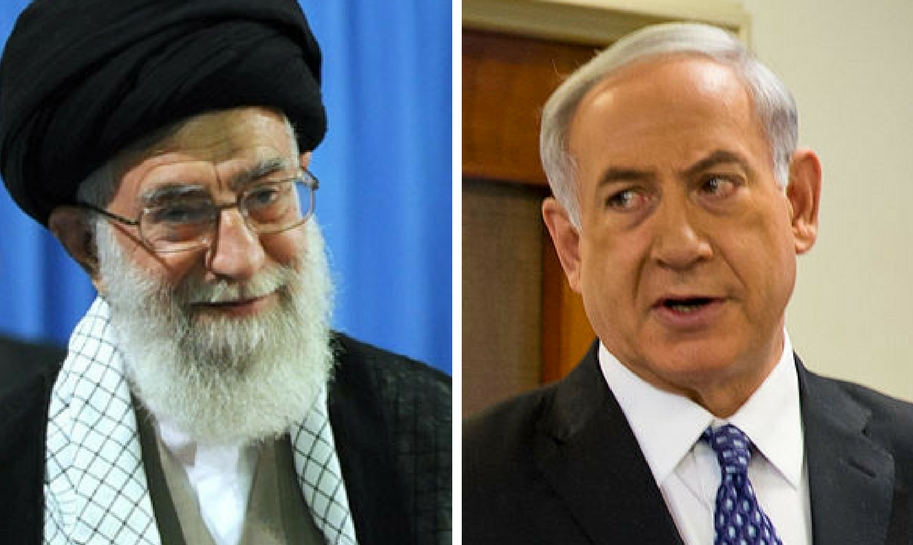by Daniel Amir
On January 1, as the world woke to a new year, Benjamin Netanyahu warmly addressed the people of Iran. Like many leaders around the world he had been following the mass anti-regime demonstrations that began in the holy city of Mashhad several days earlier and had spread through the country. Over the following days, Iranian demonstrators chanted “death to the dictator” and “freedom, independence, the Iranian Republic” and tore down posters bearing the face of the Iranian Revolutionary Guard Corps’s Quds Force Commander Qassem Soleimani. What had begun as simply economic protests over the state of Iran’s economy—rising prices, high cost of living, inflation—became an all-out show of frustration with the government and its corruption. These are the largest protests since the bloody demonstrations in 2009 that followed the disputed re-election of hardline president Mahmoud Ahmadinejad.
When Netanyahu urged on the protesters in their “noble quest for freedom” he seemed to miss a central irony of his message. For weeks now Israelis have marched against the corruption of his own government, of his continued struggle to hold on to power even as the Israeli police question him time and time again over corruption allegations. All through December, around 10,000 Israelis joined weekly protests in Tel Aviv, Jerusalem, and Haifa. They held up placards calling corrupt politicians a “cancer” and demanded from them greater personal integrity. One sign, a testament to the overarching political affiliations the demonstrations attract, bore the words: “Jerusalem is forever; you are not.”
Like Iranians, Israelis are above all demanding moral governments with real accountability. When the populations of both nations take to the streets, they face different risks and responses, but both are met with similar intransigence.
The leaders of the 2009 Green Movement that rose up against Ahmadinejad have been under a regime-imposed unlawful house arrest since 2011. They are living proof of the precarity of meaningful change in Iran despite the election and reelection of Hassan Rouhani (a self-styled moderate) in 2013 and 2017, and the signing of the Iran deal. Although these events have brought with them a distinct shift in political tone from the Ahmadinejad era, it’s not been enough for the Iranian people—or for Israel and the United States.
In 2011, similar social-justice protests broke out in Israel as demonstrators thronged the tent-lined Rothschild Boulevard and chanted “the people want social justice.” During those protests, however, there were few explicit demands for greater efforts by the government for peace, for an end to the occupation. Even now, the notion of peace seems too divisive a concept to throw into the chants at Israeli protests for it would throw a spanner in the works of a movement that describes itself as “neither left nor right, only straight” (although many politicians on the right reject this identification).
Still, protesters on the streets in Tehran and Tel-Aviv have something more in common than their frustration with years of unchanging leadership that has gone sour: the imbalance of domestic and foreign policy concerns. Iranians shouted “leave Syria, think about us” in a nod to the IRGC’s role not only in propping up Syrian leader Bashar al-Assad but also in Iran’s economy. President Hassan Rouhani has repeatedly criticized the large stake the IRGC and other unelected institutions play in Iran’s economy, most recently in a December 10 speech. The people clearly feel left behind by a consistent lack of transparency and a shadow economy dominated by elite cadres.
In Israel, too, the government is able to put domestic policy on the back burner. Netanyahu may be unappealing when it comes to the economy and charges of personal corruption, but these minuses are offset by his hawkish stances on Palestine and Iran. His experience as the outward-facing defender of Israel has gained him enough kudos to keep his public opinion numbers relatively high, a reputation strengthened by Donald Trump’s recognition of Jerusalem as Israel’s capital.
The way grievances are expressed in the two countries—and their respective political structures—are not similar by any stretch of the imagination. In both countries, however, the mask of ideology has for too long allowed political classes to act with impunity. Iranians and Israelis are fed up. People are not simply looking for jobs and cheaper eggs. They’re laying down their lives for something else. It’s the moral economy, stupid!
Daniel Amir is a graduate of Oxford University in Persian Studies and an MSc candidate in Conflict Studies at the London School of Economics. He has extensive experience in counter-terrorism and foreign policy research in Jerusalem, London, and Washington. @Daniel_Amir1. Photo: Ayatollah Khamenei and Benjamin Netanyahu






Politicians’ hypocrisy is like plague, it never leave them until it has put them in their graves. And this disease doesn’t just infect those Mullahs or Netanyahu type of criminals, right here in the U.S. we have more of them than any other country has.
So some Iranians are wanting to be ‘Shocked and Awed’ by Israel’s personal merc army, the USA?
Most of these anti-govt demos in Iran are backed by CIA-Mossad assets that are working on behalf of slumlord Kushner and his head-chopping buddy from KSA, MBS.
When some of the signs said “Hamas out of Gaza” and some of the alleged scenes showed English lettering on burnt vehicles, even a doofus could see thru this latest regime change BS.